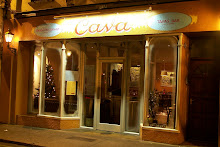Extremadura is an autonomous community of western Spain whose capital city is Mérida. It borders Portugal to the west, and it is an important area for wildlife, particularity the Iberian Pig.
Extremadura is built upon the foundations of roman settlements. Mérida became the capital of the Roman Lusitania province, and one of the most important cities in the Roman Empire.
To the north, Extremadura borders Castile and León (provinces of Salamanca); to the south, it borders Andalusia (provinces such as Seville); and to the east, it borders Castile-La Mancha (provinces of Toledo).
The climate of Extremadura is Mediterranean, except to the north, where it is continentalized, and to the west, where the influence of the Atlantic makes the climate milder. In general, it is characterized by its very hot and dry summers, with great droughts, and its long and mild winters due to the oceanic influence because of its proximity to the Atlantic coast of Portugal.
The only language that is officially recognized is Spanish, but other languages are also spoken, such as Portuguese.
Wild Black Iberian pigs roam in the area and consume acorns from oak groves. These pigs are caught and used for the cured ham dish jamón ibérico. (We have this in the restaurant) The higher the percentage of acorns eaten by the pigs, the more valuable (and expensive) the ham. Iberian Ham that can boast an acorn-fed average of 90%+ (of the pigs' diet) can be sold for more than twice as much as ham whose pigs ate on average less than 70% of acorns, for example.
Extremadura is known for the different ways of preparing the Iberian pork. The main characteristics of the traditional Extremaduran cuisine were its simplicity, its lack of clutter and its low cost. It is also a cuisine reflecting a generous spirit, for many of its preparations used to be cooked in large pots to share with visitors, friends and neighbours. The resulting dishes are eaten with local bread. The preferred spices in Extremaduran cuisine are garlic, bay leaves and anise. Olive oil is used for frying and as an ingredient in many dishes.
The most famous dishes of Extremadura are the cocido extremeño, the potaje de garbanzos y judías blancas (chick pea and bean soup), the sopa blanca de ajos (white garlic soup), the potaje de castañas secas (chestnut soup), the olla con "asaura" (a stew with offal and blood), the Ajoblanco extremeño and the gazpacho extremeño (a variant of gazpacho with ham).
Key Grape Varieties:
Red: Bobal, Monastrell, Tempranillo, Garnacha, Merlot, Syrah and Cabernet Sauvignon
White: Chardonnay, Viura, Verdejo and Pedro Ximénez.
About Cava

- Cava
- Galway, Ireland
- Cava opened in May 2008. It is the only Spanish Restaurant in Galway. It serves Tapas,á la carte, Lunch and brunch and is opened 7 days a week. It is said to have the best Tapas in Ireland and its all Spanish Wine and beer menu is the largest in Ireland.
Sunday, November 28, 2010
Wednesday, November 3, 2010
D is for Denominación de Origen
Denominación de Origen (Designation of Origin - DO) is part of a regulatory classification system primarily for Spanish wines (similar to the French appellations). In wines it parallels the hierarchical system of France (1935) and Italy (1963), although Rioja (1925) and Sherry (1933) preceded the full system. For wines, it performs a role regulating the quality and geographical origin of the wine, ensuring that the that its method of production adn the final product are of a good standard.
 Denominación de Pago (DO de Pago): Individual single-estates with an international reputation.
Denominación de Pago (DO de Pago): Individual single-estates with an international reputation.Denominación de Origen Calificada (DOCa/DOQ): Top-quality wine regions.
Denominación de Origen (DO): mainstream quality-wine regions.
Vino de Calidad Producido en Región Determinada (VCPRD): Less stringent regulation with specific geographical origin.
Vinos de la Tierra (VdlT): "country wine" areas which may use a regional name.
Vino de Mesa - Table wine, production of which has been in decline in recent years.
Most of the wine in Cava are DO status, but all the wines from Rioja and Priorat that we have in the restaurant are DOCa. We also have some amazing Vinos de la Tierra, from Mallorca which are just as expensive as the ones from Rioja. There is alot of politics behind the Denominación de Origen. It is not only about mataining quality but also about promoting certain regions as the best, for example Rioja.
All the top levels wine, the Denominación de Pago, are extermely expensive and rare. Dominio de Valdepusa, for example, is one of only nine Denominaciones de Origen de Pago existing in Spain as of 2009. This conferring means that in addition to having a proven track record of consistent quality, the wines have to be both produced from estate-grown grapes and also have to be processed and aged in a winery (bodega) located on the estate.
This bottle will set you back about €60 in Spain, which means if you did get it in Ireland you may be looking at lot more due to transport, excise duty, and Vat.
Subscribe to:
Comments (Atom)


